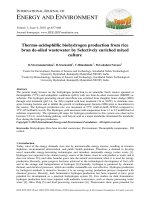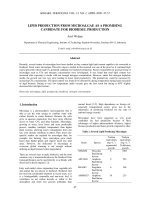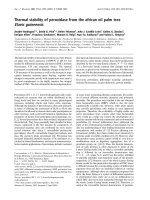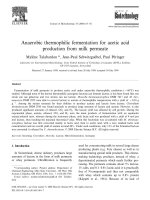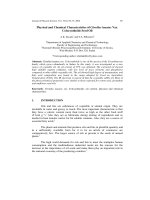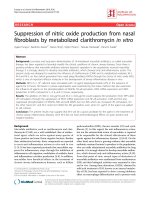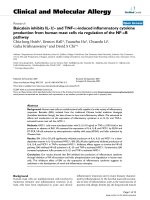Biodiesel production from rubber seed oil
Bạn đang xem bản rút gọn của tài liệu. Xem và tải ngay bản đầy đủ của tài liệu tại đây (60.63 KB, 1 trang )
BIODIESEL PRODUCTION FROM RUBBER SEED OIL
Author: Nguyen Thi Thanh Xuan, Huynh Van Anh Thi, Le Thi Bich Yen
University of Science and Technology – The University of Danang;
College of Commerce of Danang, Viet Nam
Abstract:
World’s energy crisis, global warming, diminishing fossil fuel reserves are raising concerns
and inevitability to find more economic and more environmentally friendly solutions to satisfy
the current energy consumption. The results of various researchers support the use of biodiesel
as a viable alternative to conventional petroleum fuel. However, biodiesel production from
refined edible oil types such as sunflower, soybean or palm oil causes the risk of competition
with food and land that increases the overall production cost of the biodiesel which is not
economical. Hence, it is better to use the non-edible types of oil for biodiesel production. The
aim of this paper is to study the suitability of locally available rubber seed oil in Vietnam as
substitutes to conventional diesel fuel in diesel engines. The significant properties of rubber
seed oil include oil content, water content, acid value, density, viscosity which are found out
during this investigation. Rubber seed oil possesses a very high free fatty acid (FFAs), which
results in developing a two-step transesterification method to produce biodiesel from rubber
seed oil: (1) acid catalyzed esterification reduces the FFA content of the oil to less than 2%;
(2) alkaline catalyzed transesterification process converts the products of the first step to its
mono-esters and glycerol.
Key words: Rubber Seed oil; Biodiesel; Rubber Seed oil Properties; Tranesterification
method; Biodiesel Production.
